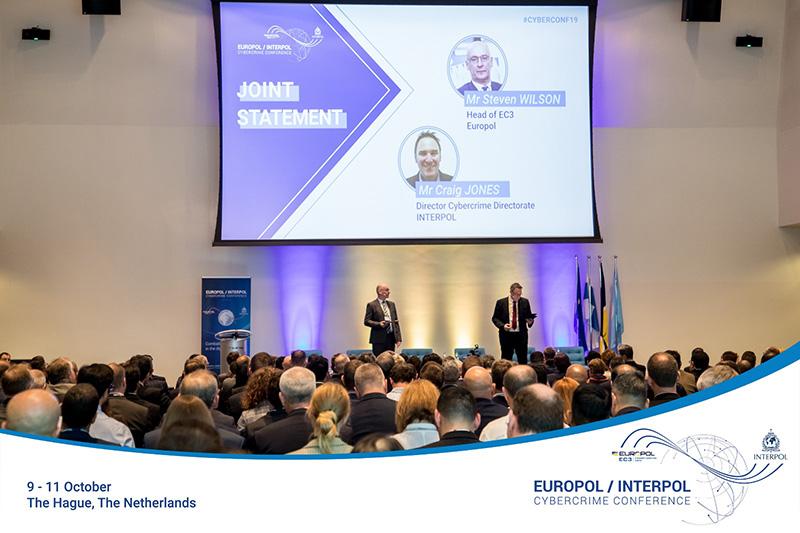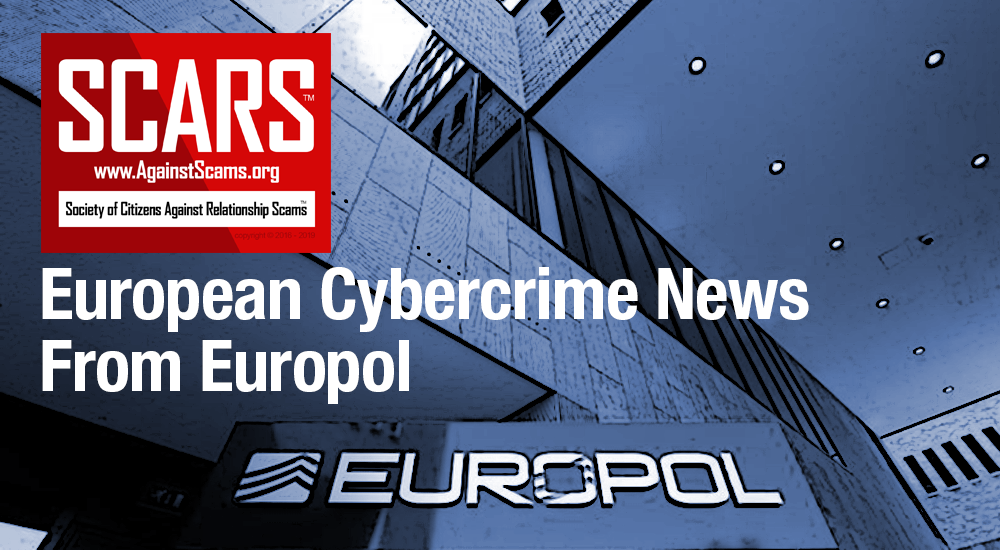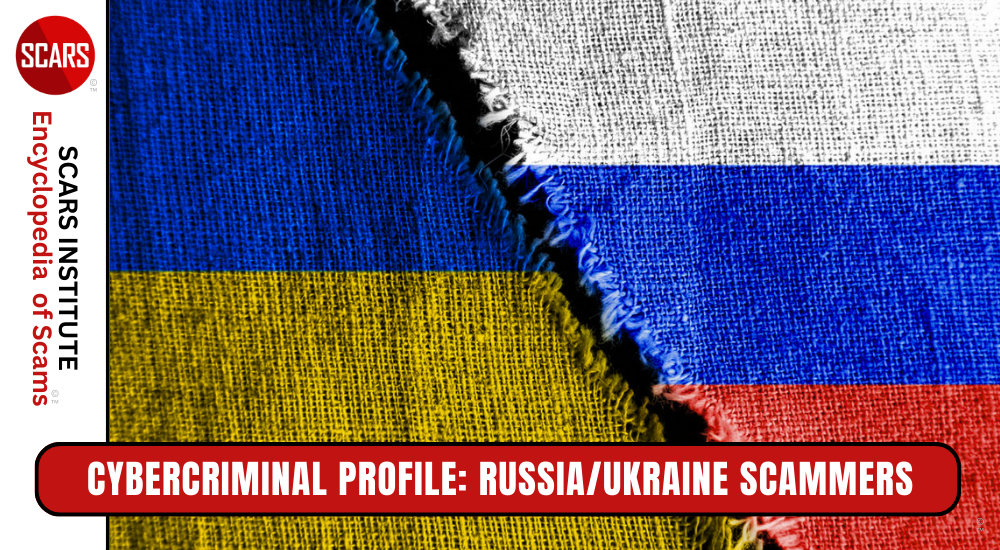
SCARS Institute’s Encyclopedia of Scams™ Published Continuously for 25 Years

SCARS™ Special Report: Fighting Cybercriminals In A Connected Future World
Insights From The Europol-INTERPOL Cybercrime Conference Examined Latest Cyber Threats, Trends And Strategies At The Hague, Netherlands 2019
A couple of months back, more than 400 experts from law enforcement, the private sector, and academia have gathered this week at Europol’s headquarters in The Hague for what is one of the world’s biggest platforms of exchange on cybercrime.

Europol-INTERPOL Cybercrime Conference examined the latest cyber threats, trends, and strategies – attended by SCARS
Under the theme of ‘Law enforcement in a connected future’, the 7th Europol-INTERPOL Cybercrime Conference looked at ways how to effectively combine the expertise, resources, and insights of law enforcement, the private sector, and academia to make the internet a more secure environment, especially in a society, which is becoming increasingly dependent on digital capabilities.
Over the course of three days (9-11 October), 50 experts elaborated on the most pressing cyber threats of today and tomorrow. Key themes included the benefits and challenges of Artificial Intelligence for police; the potential impacts of 5G technology; cross-border access to electronic evidence; obstacles to international cooperation on cybercrime investigations; the importance of cyber capacity building; cryptocurrency trends and challenges; the use of open-source intelligence and privacy considerations.
This year, speakers included the Executive Assistant Director of the FBI’s Criminal, Cyber, Response and Services Branch, Ms. Amy S. Hess and the General Manager of Microsoft’s Digital Crimes Unit, Ms. Amy Hogan-Burney, both of whom delivered keynote speeches on the threats perceived by their respective communities. Another international speaker was Mr Cyrus Roberts VANCE Jr., the incumbent District Attorney of New York County, who spoke on the impact of encryption on criminal investigations.
As highlighted in Europol’s 2019 Internet Organised Crime Threat Assessment (IOCTA) presented at this conference, cybercriminals continue to become more audacious, shifting their approach away from scattered to more focused, carefully crafted attacks against larger, more profitable targets with the potential for ominously greater damage and major disruptions.
This year’s conference saw the participation of over 100 organizations and more than 70 different law enforcement agencies engaging in fruitful and solution-oriented discussions on how to tackle the challenges at hand head-on in a collective manner.
Conclusions Emphasized A Need For Even Closer Cooperation In The Areas Of:
- Business Email Compromise (BEC): while BEC is not new, it is evolving, causing increasing economic damage. BEC exploits the way corporations do business, taking advantage of segregated corporate structures, and internal gaps in payment verification processes.
- Scams: Greater cooperation in transnational cyber-enabled crimes, such as scams.
- Terrorism: continued close examination of the interactions between cybercrime and terrorist organizations.
- Dark web: as the dark web evolves, it has become a threat in its own right, and not only as a medium for the sale of illicit commodities such as drugs, firearms or compromised data. The impact of law enforcement action in this arena is palpable as the environment remains in a state of flux.
- Research & Development: Technology develops at an ever-increasing pace, creating new challenges and opportunities for law enforcement. Adding to this the data volume challenge, legal challenges and a constantly expanding threat surface, there is a need for research and development to develop solutions addressing the needs of law enforcement in an efficient and agile way.
- Innovation: The incorporation of innovation, as part of an effective crime response, is not exclusively a private sector affair. Europol and INTERPOL already cooperate with industry partners and academia to identify challenges and opportunities for law enforcement arising from new and emerging technologies, such as 5G.
Mr. Steven WILSON, Head of Europol’s European Cybercrime Centre (EC3), said: “Three days of conference with partners from law enforcement, industry and academia have shown what we can achieve when we work closely together to tackle the global issue of cybercrime. We must make progress in prevention, legislation, enforcement, and prosecution. All of these elements are necessary in order to disrupt organized crime activity and reduce the online threat to businesses, governments, and, above all, EU citizens. I look forward to building on our trusted relationships to deliver an improved international response to this ever-increasing challenge.”
With cybercriminals constantly evolving and transforming their tactics, INTERPOL’s Director of Cybercrime Craig JONES said the traditional model of policing is ‘being challenged like never before’. “The cybercriminal world is agile and adapting, connecting and cooperating in ways we never imagined even just a few years ago,” said Mr. JONES. “Law enforcement must adapt to this ever-changing criminal environment in order to effectively protect our communities in the cyber domain,” he concluded.
On the occasion of this conference, Europol also launched CRYPTOPOL, Europol’s first-ever cryptocurrency-tracing training software, developed and co-created in close cooperation with CENTRIC (Centre of Excellence in Terrorism, Resilience, Intelligence and Organised Crime Research). CRYPTOPOL is a simulator of a cryptocurrency investigation with an emphasis on hands-on practice using real-life situations. CRYPTOPOL is accessible to all law enforcement cryptocurrency investigators around the world who can contact Europol to request access to the software for training purposes. As the software contains information about tracing techniques used by law enforcement there is no intention of making it publicly available.
Unfortunately, there was insufficient focus on the impact on individual victims. However, with the presence of SCARS, providing the victims’ perspective, we can expect greater attention in future conferences.
The Europol-INTERPOL Cybercrime Conference is a joint initiative launched in 2013 is held annually, it is hosted in alternate years by Europol and INTERPOL.
Europol Definition of Cybercrime
Technical innovation can be harnessed for social good, but just as readily for nefarious ends. This is truer of cybercrime than of perhaps any other crime area. And cybercriminals are also getting more aggressive. That’s why Europol and its partner organizations are taking the fight to them on all fronts.
According to the most recent Internet Organised Crime Threat Assessment (IOCTA) , cybercrime is becoming more aggressive and confrontational. This can be seen across the various forms of cybercrime, including high-tech crimes, data breaches and sexual extortion.
Cybercrime is a growing problem for countries, such as EU Member States, in most of which internet infrastructure is well developed and payment systems are online.
But it is not just financial data, but data more generally, that is a key target for cybercriminals. The number and frequency of data breaches are on the rise, and this, in turn, is leading to more cases of fraud and extortion.
The sheer range of opportunities that cybercriminals have sought to exploit is impressive. These crimes include:
- using botnets—networks of devices infected with malware without their users’ knowledge—to transmit viruses that gain illicit remote control of the devices, steal passwords and disable antivirus protection;
- creating “back doors” on compromised devices to allow the theft of money and data, or remote access to the devices to create botnets;
- creating online fora to trade hacking expertise;
- bulletproof hosting and creating counter-anti-virus services;
- laundering traditional and virtual currencies;
- committing online fraud, such as through online payment systems, carding and social engineering;
- various forms of online child sexual exploitation, including the distribution online of child sex-abuse materials and the live-streaming of child sexual abuse
- the online hosting of operations involving the sale of weapons, false passports, counterfeit and cloned credit cards, and drugs, and hacking services.
High-Tech Crimes
Malware, or malicious software, infiltrates and gains control over a computer system or a mobile device to steal valuable information or damage data. There are many types of malware, and they can complement each other when performing an attack.
- A botnet (short for robot network) is made up of computers communicating with each other over the internet. A command and control center uses them to send spam, mount distributed denial-of-service (DDoS) attacks (see below) and commit other crimes.
- A rootkit is a collection of programs that enable administrator-level access to a computer or computer network, thus allowing the attacker to gain root or privileged access to the computer and possibly other machines on the same network.
- A worm replicates itself over a computer network and performs malicious actions without guidance.
- A trojan poses as or is embedded within, a legitimate program, but it is designed for malicious purposes, such as spying, stealing data, deleting files, expanding a botnet, and performing DDoS attacks.
- A file infector infects executable files (such as .exe) by overwriting them or inserting infected code that disables them.
- A backdoor/remote-access trojan (RAT) accesses a computer system or mobile device remotely. It can be installed by another piece of malware. It gives almost total control to the attacker, who can perform a wide range of actions, including:
- monitoring actions
- executing commands
- sending files and documents back to the attacker
- logging keystrokes
- taking screenshots
- Ransomware stops users from accessing their devices and demands that they pay a ransom through certain online payment methods to regain access. A variant, police ransomware, uses law enforcement symbols to lend authority to the ransom message.
- Scareware is a fake anti-virus software that pretends to scan and find malware/security threats on a user’s device so that they will pay to have it removed.
- Spyware is installed on a computer without its owner’s knowledge to monitor their activity and transmit the information to a third party
- Adware displays advertising banners or pop-ups that include code to track the user’s behavior on the internet
The Response: Pursuing Cybercriminals On All Fronts
With such a range of activities being pursued with such inventiveness, the response of Europol and its partners must itself be comprehensive, dynamic and relentlessly innovative. And it is.
First, there’s the institutional response. In 2013 Europol set up the European Cybercrime Centre (EC3) to bolster the response of law enforcement to cybercrime in the EU and help protect European citizens, businesses and governments.
Each year the EC3 issues the aforementioned Internet Organised Crime Threat Assessment (IOCTA), which sets priorities for the EMPACT Operational Action Plan in the areas of cybercrime that are the focus for that year.
The EC3 also hosts the Joint Cybercrime Action Taskforce (J-CAT). Its mission is to drive intelligence-led, coordinated action against key cybercrime threats through cross-border investigations and operations by its partners.
These institutional arrangements have led to notable successes at the operational level, including:
- the coordination of a joint operation, including private-sector partners to target a botnet, Ramnit, that had infected millions of computers around the world;
- coordination with EUROJUST in an operation targeting large-scale malware attacks that originated in Ukraine and that were being investigated by a number of agencies — an operation that led to tens of arrests and continues to supply evidence that supports other cybercrime investigations;
- an operation targeting a major cybercriminal forum engaged in trading hacking expertise, malware and botnets, Zero Day Exploits, access to compromised servers, and matching partners for spam campaigns and malware attacks.
Europol separates cybercrimes from cyber-enabled crimes – such as scams, extortion, harassment, and cyberbullying and addresses these separately.
However, significant side discussions were held to address cyber-enabled crimes and approaches to victims’ assistance.
SCARS is an affiliate of Europol in its educational initiatives to address cybercrime and cyber-enabled crime awareness and victims’ assistance and support. SCARS is also an affiliated organization with the Council of Europe on cybercrime initiatives.
EUROPOL is a body of the European Union.
TAGS: SCARS, Important Article, Information About Scams, Anti-Scam, Europol, Interpol, Law Enforcement Conference, Cybercriminality, Cybercriminals, Cybercrime,
PLEASE SHARE OUR ARTICLES WITH YOUR CONTACTS
HELP OTHERS STAY SAFE ONLINE
SCARS™ Team
Society of Citizens Against Relationship Scams Inc.
A U.S. Based Crime Victims Assistance Nonprofit Organization
The Latest SCARS Posts:
FIND MORE SCAM NEWS
«SCAMCRIME.COM»
JOIN US ON FACEBOOK
«CLICK HERE»
END
MORE INFORMATION
– – –
Tell us about your experiences with Romance Scammers in our
« Scams Discussion Forum on Facebook »
– – –
FAQ: How Do You Properly Report Scammers?
It is essential that law enforcement knows about scams & scammers, even though there is nothing (in most cases) that they can do.
Always report scams involving money lost or where you received money to:
- Local Police – ask them to take an “informational” police report – say you need it for your insurance
- U.S. State Police (if you live in the U.S.) – they will take the matter more seriously and provide you with more help than local police
- Your National Police or FBI « www.IC3.gov »
- The SCARS|CDN™ Cybercriminal Data Network – Worldwide Reporting Network on « www.Anyscam.com »
This helps your government understand the problem, and allows law enforcement to add scammers on watch lists worldwide.
– – –
To learn more about SCARS visit « www.AgainstScams.org »
Please be sure to report all scammers
on « www.Anyscam.com »
Disclaimer:
SCARS IS A DIGITAL PUBLISHER AND DOES NOT OFFER HEALTH OR MEDICAL ADVICE, LEGAL ADVICE, FINANCIAL ADVICE, OR SERVICES THAT SCARS IS NOT LICENSED OR REGISTERED TO PERFORM.
IF YOU’RE FACING A MEDICAL EMERGENCY, CALL YOUR LOCAL EMERGENCY SERVICES IMMEDIATELY, OR VISIT THE NEAREST EMERGENCY ROOM OR URGENT CARE CENTER. YOU SHOULD CONSULT YOUR HEALTHCARE PROVIDER BEFORE FOLLOWING ANY MEDICALLY RELATED INFORMATION PRESENTED ON OUR PAGES.
ALWAYS CONSULT A LICENSED ATTORNEY FOR ANY ADVICE REGARDING LEGAL MATTERS.
A LICENSED FINANCIAL OR TAX PROFESSIONAL SHOULD BE CONSULTED BEFORE ACTING ON ANY INFORMATION RELATING TO YOUR PERSONAL FINANCES OR TAX RELATED ISSUES AND INFORMATION.
This content and other material contained on the website, apps, newsletter, and products (“Content”), is general in nature and for informational purposes only and does not constitute medical, legal, or financial advice; the Content is not intended to be a substitute for licensed or regulated professional advice. Always consult your doctor or other qualified healthcare provider, lawyer, financial or tax professional with any questions you may have regarding the educational information contained herein. SCARS makes no guarantees about the efficacy of information described on or in SCARS’s Content. The information contained are subject to change and are not intended to cover all possible situations or effects. SCARS does not recommend or endorse any specific professional or care provider, product, service, or other information that may be mentioned in SCARS’s websites, apps, and Content unless explicitly identified as such.
The disclaimers herein are provided on this page for ease of reference. These disclaimers supplement and are a part of SCARS’s websites Terms of Use.
Legal Notices:
All original content is Copyright © 1991 – 2020 Society of Citizens Against Relationship Scams Inc. (D.B.A SCARS) All Rights Reserved Worldwide & Webwide. Third-party copyrights acknowledge.
SCARS, SCARS|INTERNATIONAL, SCARS, SCARS|SUPPORT, SCARS, RSN, Romance Scams Now, SCARS|WORLDWIDE, SCARS|GLOBAL, SCARS, Society of Citizens Against Relationship Scams, Society of Citizens Against Romance Scams, SCARS|ANYSCAM, Project Anyscam, Anyscam, SCARS|GOFCH, GOFCH, SCARS|CHINA, SCARS|CDN, SCARS|UK, SCARS|LATINOAMERICA, SCARS|MEMBER, SCARS|VOLUNTEER, SCARS Cybercriminal Data Network, Cobalt Alert, Scam Victims Support Group, are all trademarks of Society of Citizens Against Relationship Scams Inc.
Contact the law firm for the Society of Citizens Against Relationship Scams Incorporated by email at legal@AgainstScams.org
-/ 30 /-
What do you think about this?
Please share your thoughts in a comment below!
Table of Contents
- Insights From The Europol-INTERPOL Cybercrime Conference Examined Latest Cyber Threats, Trends And Strategies At The Hague, Netherlands 2019
- Conclusions Emphasized A Need For Even Closer Cooperation In The Areas Of:
- The Response: Pursuing Cybercriminals On All Fronts
- Ethereum ETHM Token Trap and Pig Butchering Scams – 2026
- New U.S. Law – S.3643 – 118th Congress – Will Dramatically Impact Scammers and Terrorists – 2026
- How Scam Survivors Can Survive Valentine’s Day – 2026
- U.S. Veterans Benefits Scams – 2026
- New AI Voice Cloning Phone Scams – 2026
- An Essay on Justice and Money Recovery – 2026
LEAVE A COMMENT?
Recent Comments
On Other Articles
- SCARS Institute Editorial Team on Reporting Scams & Interacting With The Police – A Scam Victim’s Checklist [VIDEO]: “Yes, this is a scam. For your own sanity, just block them completely.” Feb 25, 15:37
- on Danielle Delaunay/Danielle Genevieve – Stolen Identity/Stolen Photos – Impersonation Victim UPDATED 2024: “She goes by the name of Sanrda John now” Feb 25, 10:26
- on Reporting Scams & Interacting With The Police – A Scam Victim’s Checklist [VIDEO]: “So far I have not been scam out of any money because I was aware not to give the money…” Feb 25, 07:46
- on Love Bombing And How Romance Scam Victims Are Forced To Feel: “I was love bombed to the point that I would do just about anything for the scammer(s). I was told…” Feb 11, 14:24
- on Dani Daniels (Kira Lee Orsag): Another Scammer’s Favorite: “You provide a valuable service! I wish more people knew about it!” Feb 10, 15:05
- on Danielle Delaunay/Danielle Genevieve – Stolen Identity/Stolen Photos – Impersonation Victim UPDATED 2024: “We highly recommend that you simply turn away form the scam and scammers, and focus on the development of a…” Feb 4, 19:47
- on The Art Of Deception: The Fundamental Principals Of Successful Deceptions – 2024: “I experienced many of the deceptive tactics that romance scammers use. I was told various stories of hardship and why…” Feb 4, 15:27
- on Danielle Delaunay/Danielle Genevieve – Stolen Identity/Stolen Photos – Impersonation Victim UPDATED 2024: “Yes, I’m in that exact situation also. “Danielle” has seriously scammed me for 3 years now. “She” (he) doesn’t know…” Feb 4, 14:58
- on An Essay on Justice and Money Recovery – 2026: “you are so right I accidentally clicked on online justice I signed an agreement for 12k upfront but cd only…” Feb 3, 08:16
- on The SCARS Institute Top 50 Celebrity Impersonation Scams – 2025: “Quora has had visits from scammers pretending to be Keanu Reeves and Paul McCartney in 2025 and 2026.” Jan 27, 17:45
ARTICLE META
Important Information for New Scam Victims
- Please visit www.ScamVictimsSupport.org – a SCARS Website for New Scam Victims & Sextortion Victims
- Enroll in FREE SCARS Scam Survivor’s School now at www.SCARSeducation.org
- Please visit www.ScamPsychology.org – to more fully understand the psychological concepts involved in scams and scam victim recovery
If you are looking for local trauma counselors please visit counseling.AgainstScams.org or join SCARS for our counseling/therapy benefit: membership.AgainstScams.org
If you need to speak with someone now, you can dial 988 or find phone numbers for crisis hotlines all around the world here: www.opencounseling.com/suicide-hotlines
A Note About Labeling!
We often use the term ‘scam victim’ in our articles, but this is a convenience to help those searching for information in search engines like Google. It is just a convenience and has no deeper meaning. If you have come through such an experience, YOU are a Survivor! It was not your fault. You are not alone! Axios!
A Question of Trust
At the SCARS Institute, we invite you to do your own research on the topics we speak about and publish, Our team investigates the subject being discussed, especially when it comes to understanding the scam victims-survivors experience. You can do Google searches but in many cases, you will have to wade through scientific papers and studies. However, remember that biases and perspectives matter and influence the outcome. Regardless, we encourage you to explore these topics as thoroughly as you can for your own awareness.
Statement About Victim Blaming
SCARS Institute articles examine different aspects of the scam victim experience, as well as those who may have been secondary victims. This work focuses on understanding victimization through the science of victimology, including common psychological and behavioral responses. The purpose is to help victims and survivors understand why these crimes occurred, reduce shame and self-blame, strengthen recovery programs and victim opportunities, and lower the risk of future victimization.
At times, these discussions may sound uncomfortable, overwhelming, or may be mistaken for blame. They are not. Scam victims are never blamed. Our goal is to explain the mechanisms of deception and the human responses that scammers exploit, and the processes that occur after the scam ends, so victims can better understand what happened to them and why it felt convincing at the time, and what the path looks like going forward.
Articles that address the psychology, neurology, physiology, and other characteristics of scams and the victim experience recognize that all people share cognitive and emotional traits that can be manipulated under the right conditions. These characteristics are not flaws. They are normal human functions that criminals deliberately exploit. Victims typically have little awareness of these mechanisms while a scam is unfolding and a very limited ability to control them. Awareness often comes only after the harm has occurred.
By explaining these processes, these articles help victims make sense of their experiences, understand common post-scam reactions, and identify ways to protect themselves moving forward. This knowledge supports recovery by replacing confusion and self-blame with clarity, context, and self-compassion.
Additional educational material on these topics is available at ScamPsychology.org – ScamsNOW.com and other SCARS Institute websites.
Psychology Disclaimer:
All articles about psychology and the human brain on this website are for information & education only
The information provided in this article is intended for educational and self-help purposes only and should not be construed as a substitute for professional therapy or counseling.
While any self-help techniques outlined herein may be beneficial for scam victims seeking to recover from their experience and move towards recovery, it is important to consult with a qualified mental health professional before initiating any course of action. Each individual’s experience and needs are unique, and what works for one person may not be suitable for another.
Additionally, any approach may not be appropriate for individuals with certain pre-existing mental health conditions or trauma histories. It is advisable to seek guidance from a licensed therapist or counselor who can provide personalized support, guidance, and treatment tailored to your specific needs.
If you are experiencing significant distress or emotional difficulties related to a scam or other traumatic event, please consult your doctor or mental health provider for appropriate care and support.
Also read our SCARS Institute Statement about Professional Care for Scam Victims – click here to go to our ScamsNOW.com website.























Thank you for your comment. You may receive an email to follow up. We never share your data with marketers.